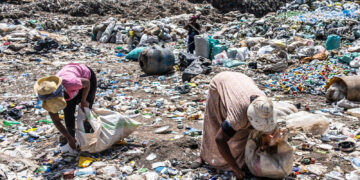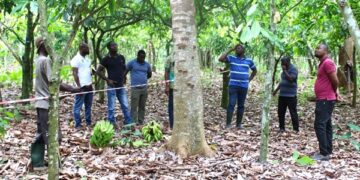Rates of hunger in Africa are unacceptably high and getting worse. The UN State of Food Security and Nutrition in the World 2024 report reveals that food insecurity in Africa is the highest of any world region. The prevalence of undernourishment is 20.4 percent (some 298.4 million Africans) – over twice the global average. The figure has grown steadily since 2015.
Climate change and conflict are contributing to this problem. But I suggest that something more fundamental lies at the heart of the challenge: the ideas and plans used in the postcolonial period to guide how Africa produces food and seeks to reduce malnutrition. While rates of food insecurity vary across the continent and are worse in Central and West Africa, this is a region-wide challenge.
I’m a scholar of African food security and agriculture. In a new book, Decolonising African Agriculture: Food Security, Agroecology and the Need for Radical Transformation, I argue that to feed Africa better, decision-makers and donors ought to:
reduce the focus on commercial agricultural production as a way to address food insecurity
stop thinking that agricultural development is solely about commercializing farming and supporting other industries
adopt an agroecological approach that uses farmer knowledge and natural ecological processes to grow more with fewer external inputs, such as fertilizers.
Conventional approaches have failed across various contexts and countries. I look at what’s going wrong with how governments think about agriculture – and where the focus needs to be instead to tackle Africa’s hunger crisis.
Focus on production agriculture
Many of the core ideas around agriculture date back to the colonial era. Modern crop science, or agronomy, was developed in Europe to serve colonial interests. The goal was to produce crops that would benefit European economies. Although this approach has been criticized, it still heavily influences agriculture today. The idea is that producing more food will solve food insecurity.
Food security has six dimensions. While increased food production might address one of these dimensions – food availability – it often fails to address the other five: access, stability, utilization, sustainability, and agency.
Food insecurity is not always about an absolute lack of food but about people’s inability to get the food that is there. Unstable prices may be one reason. Or people may not have cooking fuel. Agricultural practices may be unsustainable. This often happens when farmers have limited control over how and what they farm.
The West African nation of Mali, for example, has focused on cotton exports based on the idea that it would bolster economic growth and that cotton farmers could use their new equipment and fertilizer to grow more food. Research shows, however, that this led to the destruction of soil resources, indebtedness for farmers, and alarming rates of child malnutrition.
Another example is South Africa’s post-apartheid land reform initiatives, which adopted a large-scale commercial agricultural model. This has led to high rates of project failure and has done little to address high rates of malnutrition.
Agriculture as a first step
The second major challenge in addressing Africa’s high malnutrition rates is that many countries and international organizations don’t value agricultural development for themselves. It’s seen as the first step towards industrialization.
Commercial agriculture has become paramount. It tends to focus on a single crop, with expensive inputs (like fertilizers) and with connections to far-away markets. Smaller farms, focused on production for home consumption and local markets, are less valued. These farms may not significantly add to national economic growth, but they help the poor achieve food security.
For example, the Alliance for Green Revolution in Africa funded a rice commercialization project in Burkina Faso. Women farmers were encouraged to leave traditional practices behind, buy inputs, work with improved seeds, and sell to bigger urban markets. Sadly, research I worked on revealed that this didn’t provide great nutritional gains for the participants.
In another case, as its diamond exports boomed, Botswana largely gave up on pursuing food self-sufficiency in the 1980s. Crop agriculture was not seen as a significant contributor to the economy. This undermined the food security of poorer rural inhabitants and women. Mounting evidence of failure suggests it’s time to try a different way of addressing Africa’s food security woes. Agroecology – farming with nature – is a more decolonial approach. It covers formal research by scientists and informal knowledge of farmers who experiment in their fields.
Agroecologists study the interactions between different crops, crops, insects, and crops and the soil. This can reveal ways to produce more with fewer costly external inputs. It’s a more sustainable and cheaper option.
Common examples of agroecological practices in African farming systems are poly cropping – planting different complementary crops in the same field – and agroforestry – mixing trees and crops. These diverse systems tend to have fewer pest problems and are better at maintaining soil fertility.
No African country has fully embraced agroecology yet, but there are promising examples, many unplanned, that point to its potential. In Mali, for example, farmers briefly abandoned cotton in 2007-2008 due to low prices. There was then an upsurge in sorghum production. This largely saved the country from the social unrest and food price protests that happened in most neighboring countries.
A few land reform projects in South Africa allowed larger farms to be split into smaller plots, which had higher rates of success and more food security benefits. This suggests that a different, less commercial approach is in order.
African government leaders and donors have been slower to recognize the need for a different approach. We are beginning to see signs of change, though. For example, Senegal’s former agriculture minister, Papa Abdoulaye Seck, trained as a traditional agronomist. He now sees agroecology as a better way forward for his country. And the European Union has also begun funding a small number of experimental agroecology programs.
It’s time for a major shift in perspective. We will hopefully look back on this era as the turning point that ended intellectual colonization in the agronomic sciences.
Source: Alliance for Science






